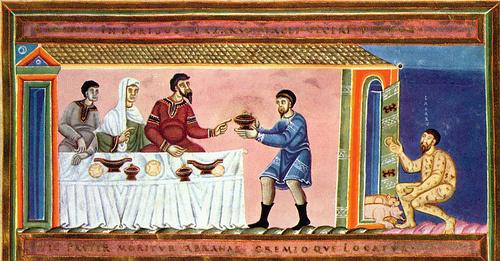
By Alan Bean
Jesus’ observation that the poor will be with us always may be the most abused passage in the Bible. Fred Clark, the Slacktivist, thinks so anyway.
It always struck me as ironic that farmers in the Texas panhandle were death on welfare while feeling perfectly entitled to the farm subsidies that kept them afloat once farming was no longer a viable livelihood. The biblical teaching on poverty is simple, straightforward, consistent, and invisible. If you wonder what I mean by that, read on.
Dives will always be with us — and so will selfish rich jackwagons who misquote the Bible
May 30, 2013 By Fred ClarkSouthern Beale is not impressed with the exegetical skills of kleptocratic Tennessee Republican Stephen Fincher:
Rep. Stephen Fincher, you are a horrible person who uses the Bible to selectively justify your greedy, selfish ways. Woe unto you.
Repent, asshole.
This is not Sunday school language, and the Civility Police will no doubt be horrified that Southern Beale is stating truth so directly and so accurately. (When someone like Fincher extravagantly flaunts his bad faith arguments, the Civility Police always insist we must pretend he hasn’t done so. Pretending, euphemistic inaccuracy, and never, ever calling out self-serving liars are the hallmarks of their idea of “civility.”)
But those who fret about such blunt honesty should note that Southern Beale’s condemnation isn’t nearly half as harsh as the rebuke Jesus himself delivers in the Bible passage the congressman misquotes. Nor is it anywhere near as stiletto-sharp as the rebuke that Moses delivers in the passage from the Bible that Jesus is reciting there.
Fincher, you see, does not like Food Stamps. He wants to cut $21 billion from food aid for poor people.
This cut would be part of the big Farm Bill — the same bill which guarantees that Fincher himself will continue to receive even more of the agricultural subsidies he’s been collecting personally for years, to the tune of $3.48 million to him directly since 1999:
At a Holiday Inn in Memphis over the weekend, Fincher expanded on his version of the Christian social gospel: “The role of citizens, of Christians, of humanity is to take care of each other, but not for Washington to steal from those in the country and give to others in the country.”
While Fincher interprets food assistance for the needy as “stealing,” he has not similarly condemned the Farm Bill’s massive agricultural subsidies. In fact, he supported a proposal to expand crop insurance by $9 billion over the next 10 years. Fincher has a great personal stake in maintaining these particular government handouts, as the second most heavily subsidized farmer in Congress and one of the largest subsidy recipients in Tennessee history:
USDA data collected in EWG’s 2013 farm subsidy database update … shows that Fincher collected a staggering $3.48 million in “our” money from 1999 to 2012. In 2012 alone, the congressman was cut a government check for a $70,000 direct payment. Direct payments are issued automatically, regardless of need, and go predominantly to the largest, most profitable farm operations in the country.
Fincher’s $70,000 farm subsidy haul in 2012 dwarfs the average 2012 SNAP benefit in Tennessee of $1,586.40, and it is nearly double of Tennessee’s median household income. After voting to cut SNAP by more than $20 billion, Fincher joined his colleagues to support a proposal to expand crop insurance subsidies by $9 billion over the next 10 years.
That argument takes a lot of gall to make. Even more galling is Fincher’s attempt to say that taking food away from poor people — in order to give more to him, personally — is the “Christian” thing to do. Cutting food assistance for the poor by $21 billion, Fincher claims, is what Jesus would want.
To find that anything other than infuriating you would need to share Fincher’s contempt for poor people, or his contempt for Jesus, or both.

This is Rep. Stephen Fincher, Republican of Tennessee. Or maybe it’s the Sheriff of Nottingham. It’s hard to tell them apart sometimes, what with their shared agenda of taking from the poor so they can plunder the public treasury.
Jesus’ own response to this — to exactly, precisely, literally the very thing that Rep. Stephen Fincher is saying — was to say, “You are accursed, depart from me into the eternal fire prepared for the devil and his angels.”
Somebody better call the Civility Police about that one.
That’s from Matthew 25. Fincher didn’t quite have the audacity to cite that chapter, instead choosing to make a mess out of a passage from the following chapter, in which Jesus says, “You always have the poor with you.” Mark’s version of that story is longer, so let’s quote that, from Mark 14:7: “For you always have the poor with you, and you can show kindness to them whenever you wish.”
That’s from the NRSV, not from Fincher’s GOP translation of Mark’s Gospel, which apparently reads, “For you always have the poor with you, and you can take $21 billion in food aid away from them whenever you wish.”
The authors of both Gospels, like Jesus himself, expected that everyone reading or hearing that phrase — “For you will always have the poor with you” — would recognize it and know where it comes from. Jesus was quoting scripture. Jesus was quoting scripture and counting on his disciples knowing that he was quoting scripture.
Fincher is quoting Jesus and counting on his listeners not knowing that Jesus was quoting scripture. Because anyone who knows that will instantly recognize that Fincher is twisting Jesus’ words into the opposite of what they mean.
Jesus was quoting from the Torah, from Deuteronomy 15. That’s another one of those Jubilee passages. The chapter starts with a quick rehash of the laws regarding the Sabbath year. Every seven years, debts must be cancelled. Thus saith the Lord.
Yes, the Bible says that. It says that over and over and over again. Every seven years, debts must be cancelled.
Jubilee and the cancellation of debt are kind of a major theme in the Bible. This tends to escape the notice of most American Christians — particularly those who most loudly proclaim themselves to be upholders of “biblical” morality. Years of painstaking conditioning have rendered this major biblical theme invisible to the eyes of American readers, so much so that people like Dave Ramsey have been able to create an industry out of teaching the opposite of Jubilee.
Every seven years, Deuteronomy 15 reminds us, “every creditor shall remit the claim that is held against a neighbor, not exacting it.” Follow all these rules for Jubilee, Deuteronomy says, and there will be no such thing as poverty:
There will, however, be no one in need among you, because the Lord is sure to bless you in the land that the Lord your God is giving you as a possession to occupy, if only you will obey the Lord your God by diligently observing this entire commandment that I command you today.
Got it? Obey the rules, Deuteronomy says, and no one will be poor. So if anyone is poor, it’s because you’re disobedient. That’s implicit in the verse above, but Deuteronomy makes it explicit in the verses that follow:
If there is among you anyone in need, a member of your community in any of your towns within the land that the Lord your God is giving you, do not be hard-hearted or tight-fisted towards your needy neighbor. You should rather open your hand, willingly lending enough to meet the need, whatever it may be. Be careful that you do not entertain a mean thought, thinking, “The seventh year, the year of remission, is near,” and therefore view your needy neighbor with hostility and give nothing; your neighbor might cry to the Lord against you, and you would incur guilt. Give liberally and be ungrudging when you do so, for on this account theLord your God will bless you in all your work and in all that you undertake. Since there will never cease to be some in need on the earth, I therefore command you, “Open your hand to the poor and needy neighbor in your land.”
That is the context for Jesus remark in the Gospels. “For you always have the poor with you” is Jesus’ direct quotation of Deuteronomy 15:11, “Since there will never cease to be some in need on the earth.”
That statement is followed by a “therefore” — “I therefore command you, ‘Open your hand to the poor and needy neighbor.’” In reciting the first part, Jesus was invoking the second, the “therefore.” He didn’t need to recite all of Deuteronomy 15 for his disciples because he knew that they, unlike American Christians like Rep. Stephen Fincher, were not biblically illiterate.
For Jesus, it was impossible to cite the first part without reinforcing the second part. The two are inextricably linked — hence that “For ..” and “Since …” in our English translations. People like Fincher who invoke the first part as a denial of the second part are mangling the Bible in obscenely perverse ways, turning Jesus’ words into their opposite and turning Christ into antichrist.
Don’t miss the rebuke there in Deuteronomy 15. That’s the key point here — it’s why Jesus chose to quote this particular passage, applying its rebuke to Judas.
“If only you will obey the Lord your God,” Deuteronomy 15 says, there will be no one in need. And then, six verses later, “Since there will never cease to be some in need …” Ouch. That passage just comes right out and says “you’re all a bunch of disobedient disobeyers who will never cease to disobey disobediently.” And in the context of the Pentateuch, that’s not good. (Do you know what Deuteronomy says should happen to the disobedient? It isn’t pretty.) In that context, that’s far harsher than anything Southern Beale had to say to Rep. Fincher.
Whenever you hear some blowhard quoting “the poor will always be with you” in the backwards, antichrist way that Fincher invoked it, there really is nothing more true, more appropriate, or more necessary to be said than just exactly what Southern Beale wrote: “You are a horrible person who uses the Bible to selectively justify your greedy, selfish ways. Woe unto you.”
And “Repent, asshole,” is actually charitable — an extension of mercy, offering Fincher,et. al., a last-gasp shot at escaping their otherwise certain fate of “You are accursed, depart from me.”
It’s not possible to avoid upsetting the perpetually upset Civility Police, but I’ll try not to give them an excuse to utter their well-rehearsed gasps here by avoiding S.B.’s salty language. Instead, I’ll just stick with quoting the G-rated, but far harsher, language of Deuteronomy:
Rep. Stephen Fincher, be careful that you do not entertain a mean thought … and therefore view your needy neighbor with hostility and give nothing; your neighbor might cry to the Lord against you, and you would incur guilt.
You would incur guilt. You have incurred guilt. You are incurring guilt.
